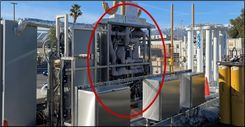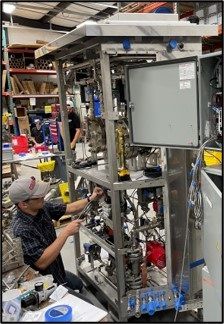Sugar Valley Energy, STARS collaborate on biogas-to-hydrogen



SORUCE: STARS Technology Corp.
August 24, 2023
BY California Ethanol + Power
Sugar Valley Energy, a subsidiary of California Ethanol & Power LLC (CE+P), and STARS Technology Corp. have announced a groundbreaking collaboration agreement to deploy cutting-edge hydrogen production technology at SVE’s planned, fully permitted 160-acre sugarcane ethanol biorefinery, bioelectric, biogas and wastewater treatment facility in Imperial Valley, California.
The SVE-STARS agreement envisions the deployment of up to 80 STARS-250 H2 Generators, producing low-cost, renewable hydrogen that meets the new federal clean hydrogen standard. These generators would be installed at SVE's low-carbon ethanol plant that will produce more than 70 million gallons of low-carbon ethanol each year. The hydrogen generators would also potentially be installed at nearby hydrogen fueling stations.
"We are excited about the potential to partner with STARS Technology Corporation to bring their state-of-the-art hydrogen production technology to our low carbon renewable sugarcane ethanol and power project,” said Dave Rubenstein, president and CEO of CE+P. “This collaboration aligns with our commitment to sustainable energy solutions and will revolutionize the production and utilization of clean hydrogen."
“This collaboration between SVE and STARS represents a significant milestone in advancing clean energy solutions and propelling sustainable development in Imperial Valley and beyond,” said Robert S. Wegeng, STARS president and chief technology officer.
Advertisement
Advertisement
Clean Hydrogen from the Biofuel Production Process
The biogas created from the waste products of the locally grown sugarcane to ethanol process would provide feedstock to the STARS H2 Generators. Collectively, the 80 STARS-250 H2 Generators can produce up to 20,000 kilograms of clean hydrogen per day, the equivalent to the typical daily fueling needs of more than 30,000 fuel cell light-duty passenger vehicles or more than 500 hydrogen fuel cell buses.
Biomethane derived from the organic byproducts of ethanol production will be used for on-site hydrogen production using STARS H2 Generators and this hydrogen will fuel the trucks and heavy equipment involved in sugarcane cultivation. Onsite hydrogen production will also enable the on-site production of ammonia, supplying SVE with a low-carbon crop fertilizer. In addition, SVE plans to inject a portion of its biomethane into nearby pipelines as renewable natural gas (RNG). This RNG can then be converted into clean hydrogen using distributed STARS H2 Generators at filling stations throughout the region.
Advertisement
Advertisement
The collaboration between SVE and STARS can establish an unprecedented agricultural-energy cycle where virtually all energy and materials produced by SVE will be converted into high-value products for use within the region while creating long term stability for growers and clean energy jobs.
The effort to grow sugarcane for the SVE project is expected to support an estimated 2,000 agricultural jobs, along with approximately 200 on-site employees who will run the energy campus. The three-year construction of the project will support thousands of additional construction jobs, local economic activity as well as city and county revenue.
The integration of STARS’ advanced technology with SVE’s sugarcane ethanol and power facility can provide significant benefits throughout Imperial Valley, California, and Arizona for years to come. These benefits extend to energy, transportation, as well as the environment, economy, and society of the region.
Related Stories
Neste and DHL Express have strengthened their collaboration with the supply of 7,400 tons (9.5 million liters) of neat, i.e. unblended, Neste MY Sustainable Aviation Fuel to DHL Express at Singapore Changi Airport starting July 2025.
CoBank’s latest quarterly research report, released July 10, highlights current uncertainty around the implementation of three biofuel policies, RFS RVOs, small refinery exemptions (SREs) and the 45Z clean fuels production tax credit.
The U.S. Energy Information Administration maintained its forecast for 2025 and 2026 biodiesel, renewable diesel and sustainable aviation fuel (SAF) production in its latest Short-Term Energy Outlook, released July 8.
XCF Global Inc. on July 10 shared its strategic plan to invest close to $1 billion in developing a network of SAF production facilities, expanding its U.S. footprint, and advancing its international growth strategy.
U.S. fuel ethanol capacity fell slightly in April, while biodiesel and renewable diesel capacity held steady, according to data released by the U.S. EIA on June 30. Feedstock consumption was down when compared to the previous month.
Upcoming Events










